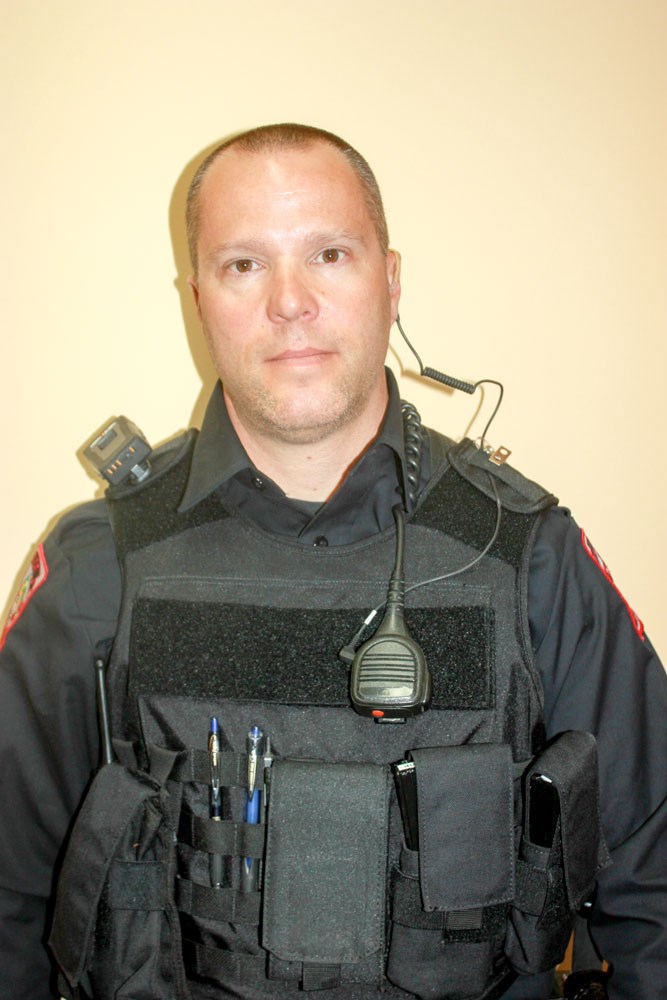Estevan Police Service (EPS) Const. Braden Lonsberry has long held an interest in forensics.
He is one of two trained forensics officers with the EPS, along with Detective Jay Pierson. Both of them had to spend two months in Ottawa going through the requisite forensics training.
So it was only fitting that Lonsberry would apply to be the new full-time forensics officer position for the EPS. The police announced recently that Lonsberry had been hired for the job.
Lonsberry was approached by Pierson some time ago about working in forensics.
“I have a bit of a computer background, and some tech experience, so that was part of the reason they asked me,” Lonsberry said in an interview with Lifestyles. “I’ve always had a bit of an interest in that type of investigation, getting right down into the evidence and looking at crime scenes.”
If a homicide, serious assault or some other major crime occurs, Lonsberry will be called to the scene. He might also be called to armed robberies, break-and-enters and other crimes where evidence collection, storage and management will be necessary.
“Any exhibits that are coming into our police service, and any members that are grabbing them, I’ll be the evidence custodian too, so I’ll be managing any evidence that’s in storage, as well,” said Lonsberry.
If the criminal investigation division has a major file that requires some added manpower, then Lonsberry will help out.
He believes there is enough work for him to do forensics on a full-time basis.
“To be perfectly honest, we’re missing some of our scenes, some of our smaller break-and-enters where maybe not a whole lot (of evidence) is taken,” said Lonsberry. “We’re not necessarily going out and processing those scenes, just because we don’t have the time allocated for it.”
But there is a lot of work to be done in terms of evidence management, crime scene analysis and fingerprint work. During the stretches when he doesn’t have a crime scene to study, then Lonsberry can focus on evidence management.
Police Chief Paul Ladouceur believes the EPS needed a full-time forensics officer, thanks to the changing nature of police work.
“The way we do business, with the amount of disclosure, and the way we obtain evidence and the way we preserve evidence, has changed significantly over the years when it comes to policing,” Ladouceur said. “Not only has the aspect of the physical gathering of evidence changed, but the scrutiny put on police when it comes to the trial process (has changed).”
There is an expectation for how evidence will be handled and how crime scenes will be treated. For someone to have that technical experience is valuable, but the police chief stressed that it’s hard to gain that experience when working on forensics on a part-time basis.
“There’s a lot of technology in policing that wasn’t there 10, 15 and 20 years ago, and that allowed that forensics position to be carried out on a part-time basis,” Ladouceur said.
Having an officer who is well-versed in technology and able to adapt with technological advancements, and how it relates to policing, will be a big benefit.
Ladouceur believes Lonsberry will be a perfect fit for the position.
“He worked on a number of investigations,” said Ladouceur. “He has been involved with everything from auto theft investigations to homicide investigations, acting in the capacity of an identification officer and a forensic ident. officer.”
The police chief wants to see a good full-time identification program established in Estevan, and he wanted a local officer with experience in forensics.
“Brayden is certainly the type of individual who brings a lot of attention to detail,” said Ladouceur. “He has a true interest in it, and I think he’ll do very, very well. I think the program will serve this community well.”
A full-time forensics officer should also help with the clearance rate of the EPS.
The new forensics lab will have to be set up, and new equipment will have to be acquired. Lonsberry finds that prospect exciting.
“There are some pretty big items, so we’re going to have to go out and see what we can purchase right now, move some stuff around, and then it will be purchase what we can for some of the other items,” said Lonsberry.
“But we can function right now, and we have been, but there are some items we can get so that we will be able to process scenes and evidence a lot better.”
Ladouceur couldn’t divulge all of the technology they have in place, or what they will purchase in the future. But they do have fingerprint identification technology and the ability to obtain DNA samples.
Lonsberry’s new job is expected to take effect some time in June, and he expects it will be a three-year term.
The shift in responsibility means Lonsberry won’t be working on patrols. He admits he will miss the patrols and interacting with the public, but he suspects he will return to patrol responsibilities eventually.




